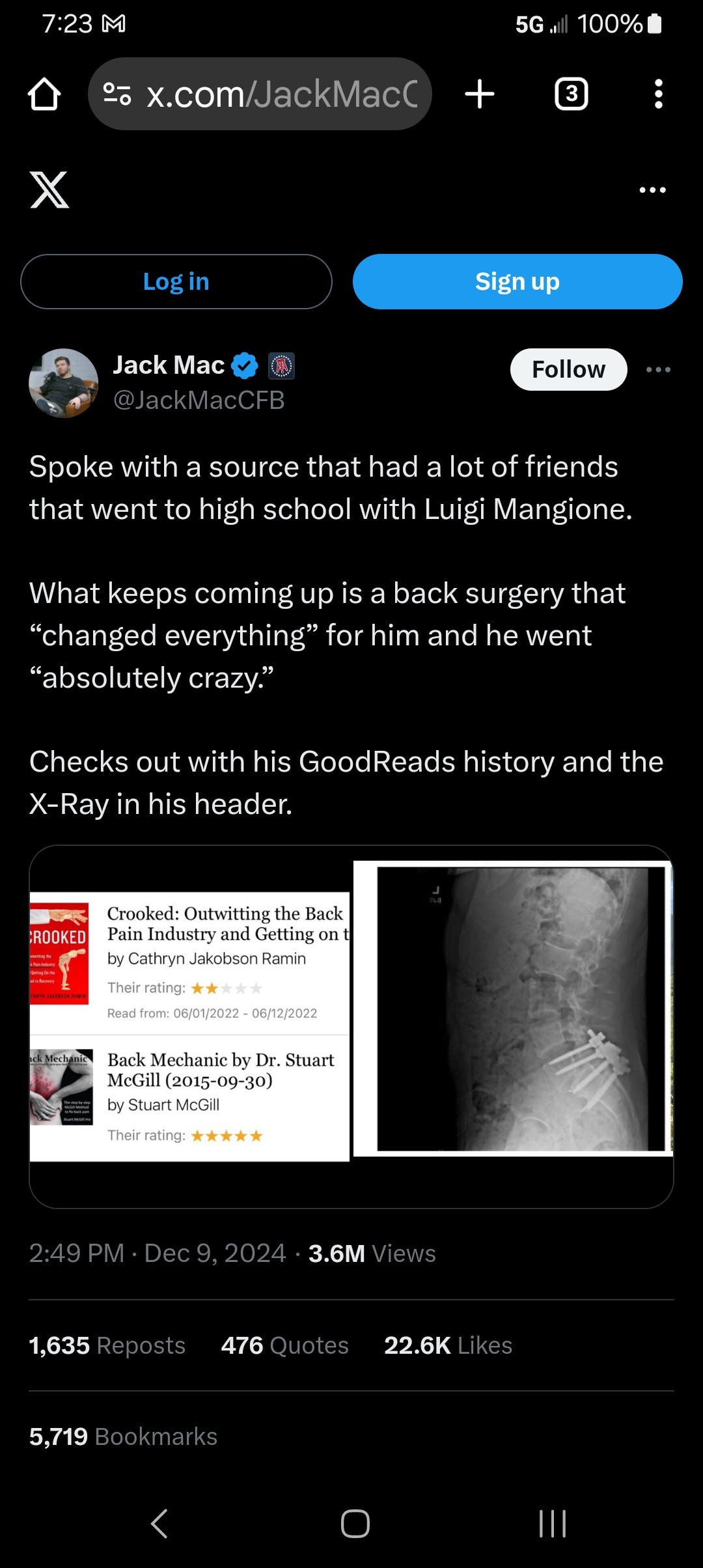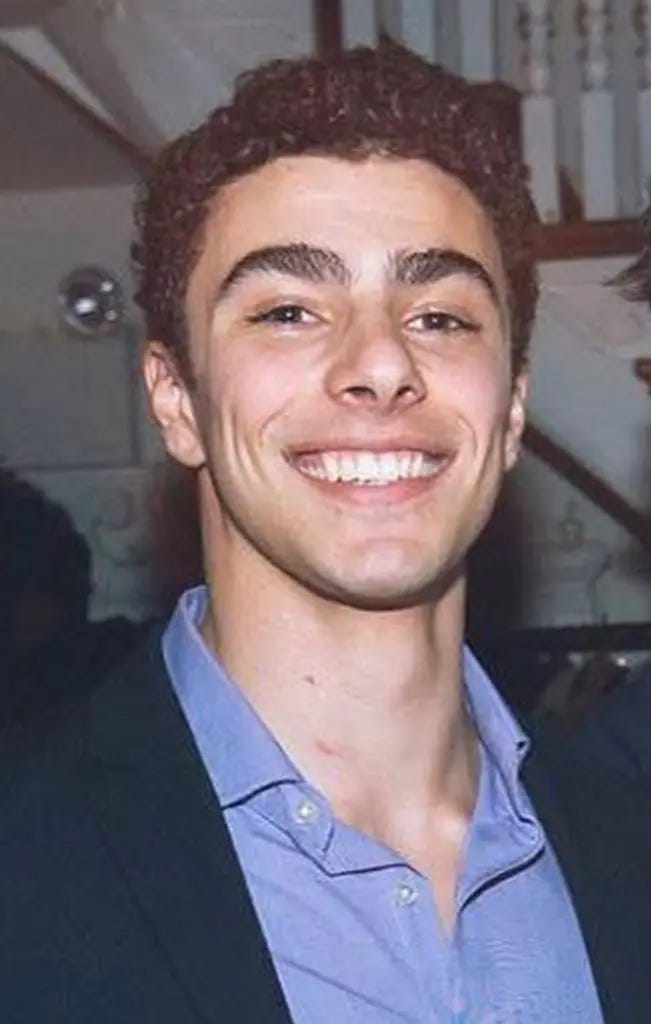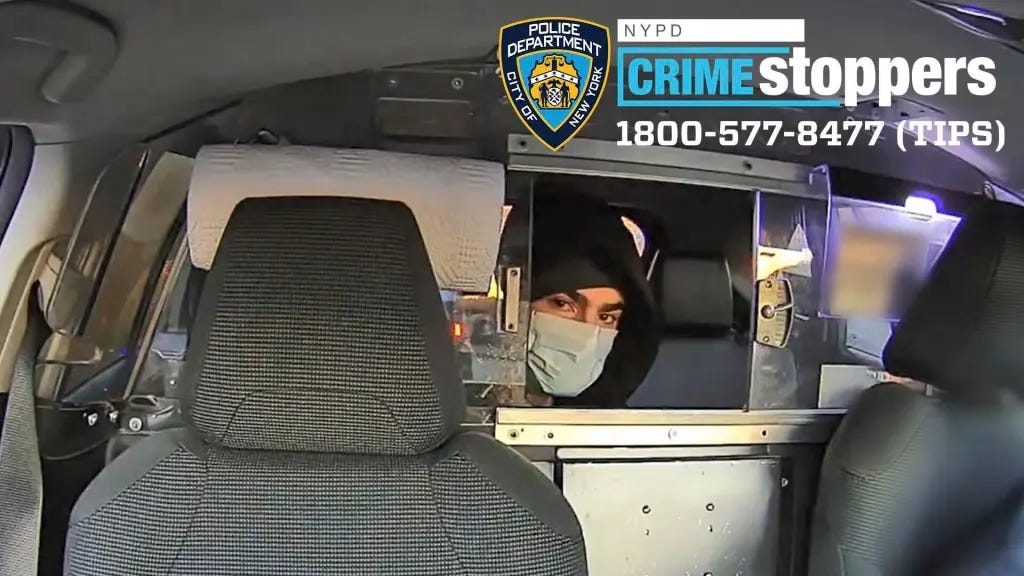Yes, Luigi Mangione is attractive--that out the way, what comes next?
Legal trouble, a flood of disinformation and hooey, that's what
I have long advocated stating the painfully obvious and not creating unneeded elephants in rooms, so here it goes. UnitedHealthcare shooter Luigi Mangione is hot as hell fire.
Should it matter?
No.
Should chicks throw their undies at him as if he were Barry White crooning Turn off The Lights on stage?
Ewww—god no!
Come to think of it, no one should be doing that. Ever. Ew. Just weird.
But let’s not kid ourselves—acknowledging someone’s looks isn’t a moral failure—it’s pretty much automatic.
Pretending not to notice Mangione’s jawline is as pointless as feigning surprise at someone wearing a red shirt. Humans are hard-wired to spot beauty. Science backs it: cheekbones, eye-nose ratio, jaw angles—our brains process it instantly.
Let’s not get it twisted—people would still point this out if the shooter was she and not he, pulling off a mask to reveal a stunning Elle-type model-worthy face with stunning green eyes and long, flowing strawberry blond tresses.
It’s incidental, inevitable, and human.
What’s less incidental? Murder.
Mangione hunted an unarmed man down and pulled the trigger—full stop.
Do I care about Brian Thompson?
As much as one should care about another human, sure. But Thompson isn’t exactly an innocent lamb; his pen mowed down lives through denied treatments and soulless corporate math.
Sympathy? Sparse. But murder remains murder, and Mangione faces the consequences.
Legal facts?
Bleak for him. Pennsylvania charges: firearms without a license, forgery, tampering, and more. New York adds murder and multiple weapons charges. Luigi’s looking at years.
So far, this is what we know on the criminal charges front:
In Pennsylvania, Mangione was charged with carrying firearms without a license, forgery, tampering with records or identification, possessing instruments of crime and providing false identification to police.
Hours later, authorities in New York charged him with one count of murder, three counts of criminal possession of a weapon and one count of possession of a forged instrument, according to online court documents. — NBC NEWS
Health concerns and familial losses
As someone who lives with harrowing back pain from Lupus/RA and a femur screw reminder of a past break, I can only imagine the toll back injuries take—especially on someone like Luigi Mangione, just 26. Knowing even minimal activity could leave him incapacitated for a week?
Heartbreaking.
Mangione wasn’t always the man we see now.
In high school, he worked at an assisted living facility, witnessing firsthand the inadequacies and indignities the elderly face. Even the well-insured aren’t immune to horrific treatment—imagine what he saw. Add losing two close grandparents back-to-back, and it’s not hard to see how despair might creep in.
It is said he broke off contact with his family for weeks before the shooting.
By all accounts, he was good, thoughtful, and kind. “The last person I’d think would do this,” a former classmate told Huffington Post. “He was a nice kid.”
Yet here we are.
I’m not excusing his actions, but I do understand them.
My husband and I lost his grandmother, father, and mother in two short years. Even with decent resources, navigating their care was an emotional grind. Good people deserve better endings, yet we were left drained and furious at the system that failed them.
Luigi’s crime won’t change the healthcare machine—it’s too big, too entrenched. But it’s a dark spotlight, a shock that has momentarily rattled the corporate ivory towers. And while Brian Thompson’s death doesn’t fix anything, it reflects a frustration many of us deeply feel: anger at a system that tears people down, rich boy heroes or not.
Disingenuous arguments and attempts to divide
The most unexpected twist in the Brian Thompson shooting?
A forged an unlikely alliance between Left and Right, united against a common foe: insurance companies. The heartbreaking tales of denied care make you want to tear a phonebook in half—or, at least, slam one down in righteous fury.
Even when conservative heavyweights like Ben Shapiro and Matt Walsh tried to stoke outrage with "The Evil Left Cheers a Fallen CEO" narratives, their audiences weren’t biting. Instead, they clapped back hard:
Shapiro’s YouTube fans: “Find another audience to play apologist to the people ruining hardworking Americans' lives. Unsubscribed.”
Walsh’s listeners: “Insurance companies are the real villains. Sympathy for CEOs is at an all-time low—R or D.”
One Republican voter even admitted, “I voted for Trump, but Ben’s out of touch. These companies destroy families.”
At least three users expressed to Walsh that even though they agree with a lot of his opinions, he was "dead wrong on this one."
"Everyone is angry at the these insurance companies," one person commented. "If you've never lost someone or been plunged into debt because of them, you can't possibly understand. It's despicable what they get away with. I don't wish death on them but I'll bet you good money, that man probably lost someone he loved because of united healthcares denial policies."
"Republican pundits don't realize this isn't as politically partisan as they wished it were. We all hate our health care system. We may not advocate for murder, but sympathy for CEOs of these organizations is at an all time low, regardless of R or D," another wrote.
Others joked that they were "a leftist now," according to Walsh, and pushed back on the "left wing" label, saying that they're not progressives just because they "hat[e] a guy who's bread and butter was literally other peoples suffering."
"The fact that [M]att is trying to paint this as a left wing issue, when theres clearly bipartisan celebrations going on, just goes to show how out of touch celebrities are, whether on the right or left, with regular everyday ordinary people," one user said. —NEWSWEEK
Ahahahahahahahaha!
Oh, wait—too soon?
It’s bipartisan: everyone hates the healthcare system. Sure, no one’s advocating murder, but the sympathy gap for people profiting off suffering?
Vast.
A united populace is a dangerous populace.
Meanwhile, the Powers That Be (PTB) are panicking over this newfound solidarity. Cue the greatest hits of divisive tropes:
Racism: “Obamacare did this!” or “Immigrants get free healthcare!”
—Narrator: No. Dumbass.
Celebrity bashing: “You guys pay Taylor Swift billions but balk at healthcare costs!”
—Reality check: Performers are not paid yah idjits, they are little more than high-ticket contract workers fetching market rates for popularity, not healthcare thieves.
Besides, you don't have to mortgage your house to see Adele! Jeez, what do the rich and powerful have against the working class taking time out of grueling 40-60 hour work weeks to enjoy themselves?
But one tactic might stick: classism. The PTB knows that a united populace is a dangerous populace. Dividing people by class lines can distract from the systemic rot at the core.
Trying to turn public sentiment against Luigi Mangione
The campaign to demonize Luigi Mangione is in full swing, and it’s as transparent as a pane of glass.
From a recent USA TODAY ARTICLE Who is Luigi Mangione, detained in UnitedHealthcare CEO's killing? Here's what we know:
Private school? University of Pennsylvania? Sure. Not exactly yacht-club material.
Grandfather founded a philanthropic foundation? Great for Nick Mangione Sr., but Luigi isn’t cashing those checks.
Tech job and a stint at Firaxis? Relatable millennial stuff, not exactly Bond-villain credentials.
The press would have you believe Luigi is some gilded elite. Spoiler: he’s not. Unless you’ve got a private island or can ghost your landlord, you’re working class—no matter how posh your LinkedIn profile sounds.
Luigi has bills to pay, like the rest of us.
And yet, outlets like USA TODAY can’t resist stoking resentment with lines like: “He’s Ivy League! Valedictorian! Baltimore royalty!” Conveniently missing the chronic back pain, personal losses, and the fact that rich relatives ≠ rich you.
I got rich folks in my family too—never helped me none.
But all of that is beside the point, isn’t it?
Lookit—Batman was rich, but he fought for the little guy, right? (Not saying Luigi is Batman—calm down, Gotham.) Even in the comics, there’s endless debate about whether Batman’s refusal to end The Joker makes him complicit in later crimes.
So, where’s that energy for systemic villains in real life?
Violence is never the answer?
Really—never ever?
Swearsies?
Yeah, right! Let’s not pretend violence is always off the table. Countries spend billions on war machines while preaching pacifism to the masses. When it’s state-sanctioned violence to protect oil pipelines? Fine. When it’s an oppressed worker striking back? Moral outrage!
It’s all very convenient for those who benefit from the system.
Look at billionaires flaunting their superyachts while laughing at us plebs toiling away. Elon Musk brags about squeezing unpaid labor for his DOGE dreams, and somehow we’re supposed to sit politely, hat in hand, and write our congressman?
What if that congressman is Elon Musk?
The truth is, people like Luigi symbolize something bigger than his Ivy League degree or his (still theoretical) folk-hero status. They’re a reminder that our rage isn’t just about wealth—it’s about exploitation.
Truth be told, we all want a piece of the American dream, we just don’t want people to suck the blood out of us to earn their gazillions.
I don’t think that is much to ask—do you?
“Violence, naked force, has settled more issues in history than has any other factor.” ― Robert A. Heinlein








I bet he’ll get a lot of marriage proposals in prison (real ones, I’m not talking about his cellmate, stop it).
That said, lack of decent health care is absolutely a bipartisan issue. The loudest voices against Medicare for all are the insurance lobby, the über wealthy and GOP congressional asshats who get it for free.
Alicia--You nailed this, as always. Hard to feel bad for a UHC executive who was on his way to announce a $650 million PROFIT for denying health care to patients. When they have to pay your health care costs, the term is MEDICAL LOSS RATIO. It's a "loss" to the company that they may be required to save a life.